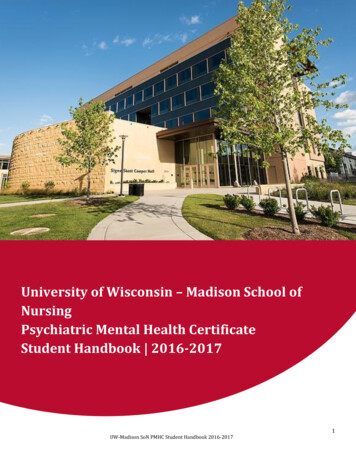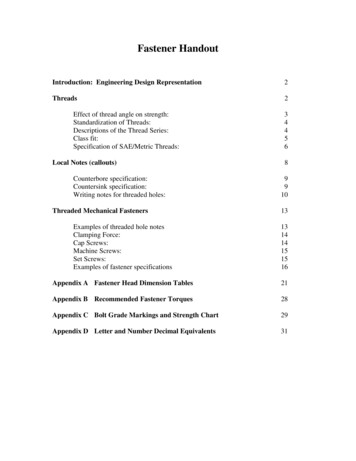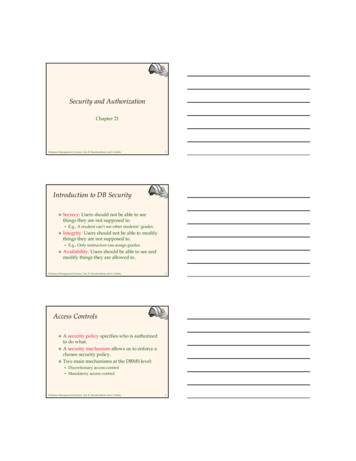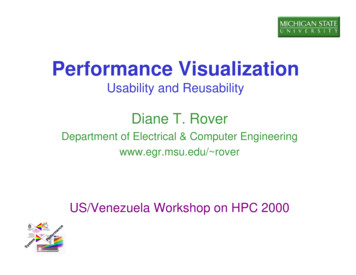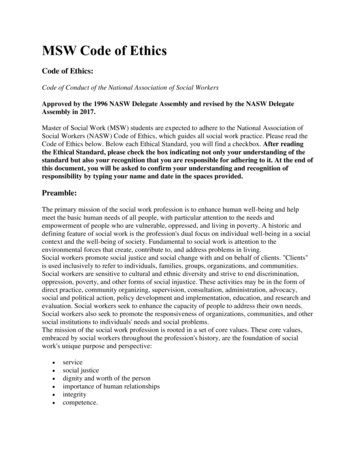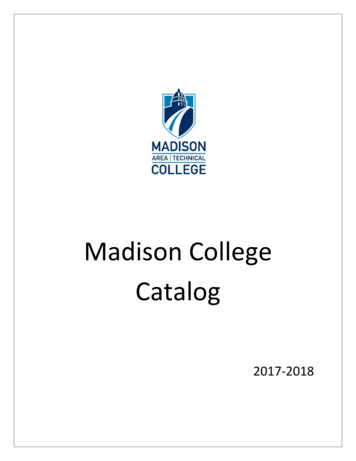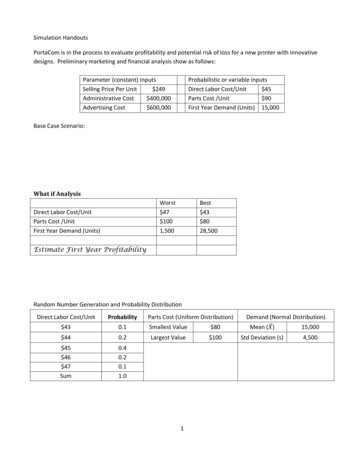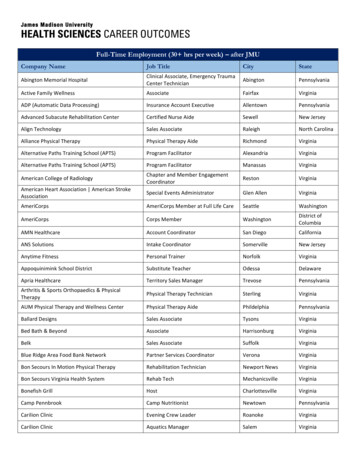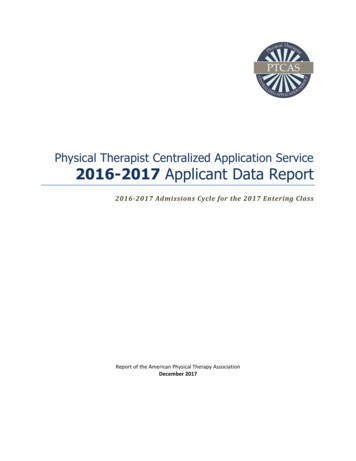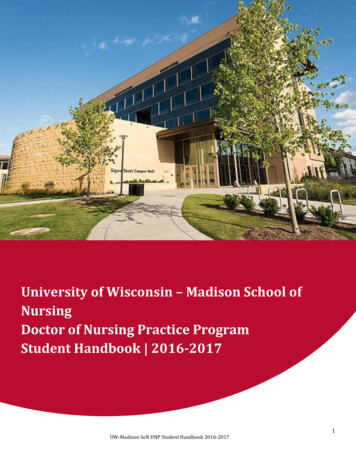
Transcription
University of Wisconsin – Madison School ofNursingDoctor of Nursing Practice ProgramStudent Handbook 2016-2017UW-Madison SoN DNP Student Handbook 2016-20171
Table of ContentsUNIVERSITY OF WISCONSIN-MADISON AND THE SCHOOL OF NURSINGWELCOME FROM THE PROGRAM DIRECTORMISSION STATEMENT AND ACCREDITATIONORGANIZATIONAL STRUCTURESCHOOL OF NURSING DIRECTORYSCHOOL OF NURSING COMMITTEESDNP PROGRAM OVERVIEWWHY A DNP?THE ESSENTIALS OF DOCTORAL EDUCATION FOR ADVANCED NURSING PRACTICEAPRN ROLE PREPARATIONPROGRAM PLAN OPTIONSNURSE EDUCATOR CERTIFICATEDNP DEGREE REQUIREMENTSCURRICULUM DETAILSCOURSE DESCRIPTIONSCONSIDERATION OF PREVIOUS COURSEWORKCLINICAL HOUR COMPLETION POLICYSCHOLARLY PROJECTSATISFACTORY PROGRESSELECTIVESSTATISTICS REQUIREMENTSCHOLARLY PROJECTINDEPENDENT STUDYBREADTH/MINOR REQUIREMENTS AND PROCEDURESACADEMIC POLICIES AND PROCEDURESGRADUATE SCHOOL ACADEMIC POLICIES AND PROCEDURESACADEMIC INTEGRITYACADEMIC MISCONDUCTHEALTH COMPLIANCE PROGRAMHEALTH COMPLIANCE REQUIREMENTSHEALTH COMPLIANCE PROCEDURESSATISFACTORY ACADEMIC PROGRESSSTUDENT APPEALS AND GRIEVANCE PROCEDURESSTUDENT EVALUATION OF INSTRUCTIONPOLICY ON EDUCATION VALIDATION FOR ADVANCED PRACTICE CERTIFICATION EXAMSDNP PROGRAM PETITION FOR SPECIAL CONSIDERATIONLEAVE OF ABSENCEWITHDRAWAL FROM THE UNIVERSITYUW-Madison SoN DNP Student Handbook 2016-20172
PROCEDURES FOR INJURIES/INCIDENTS OCCURRING DURING CLINICAL ROTATIONSLAPTOP POLICYSOCIAL MEDIA POLICYOFFICIAL COMMUNICATIONNAME CHANGESSUPPORT SERVICES FOR STUDENTSCOMPUTINGADULT STUDENT SERVICES CENTERLIBRARIESMCBURNEY DISABILITY RESOURCE CENTERDEAN OF STUDENTS OFFICEWRITING CENTERGRADUATE SCHOOL RESOURCESDNP FACULTY ADVISINGCOURSE ENROLLMENT PROCEDURETEXTBOOKSHEALTH/WELLBEING SERVICESDIVERSITYFACILITY INFORMATIONFINANCIAL AID AND SCHOLARSHIPSUW-Madison SoN DNP Student Handbook 2016-20173
UNIVERSITY OF WISCONSIN-MADISON AND THE SCHOOL OF NURSINGWELCOME FROM THE PROGRAM DIRECTORWelcome to the University of Wisconsin-Madison School of Nursing (SoN) DNP program! On behalf of our faculty, I wantto extend a warm welcome and share our excitement about working with you. We seek to meet the increasinglycomplex challenges of healthcare by preparing our students for innovative advanced practice and clinical leadership.Soon enough, you will have a hand in helping to improve health and shape the future of the DNP. These are excitingtimes, and we are so pleased that you made the decision to join us.We recognize that you are making a significant investment in your nursing career, and are committed to offeringcoursework and clinical opportunities that will help prepare you to meet your goals. I encourage you to fully immerseyourself in our program and actively engage in the processes of learning. Being a student at UW-Madison has manybenefits. Please make the most of the unique opportunities and rich resources available to you throughout theUniversity.The 2016-2017 DNP Student Handbook will give you an overview of the UW-Madison School of Nursing DNP program,and answer some of the common questions that arise in graduate school. Please familiarize yourself with its contentsand use it as a resource. Individual course professors, our DNP Program Coordinator, the School of Nursing AcademicPrograms staff, and your individual academic advisor are also here to help. Our entire faculty and staff stand ready andwilling to teach, support, mentor, and encourage your success.I wish you great personal and professional growth as you embark on this important journey. May your studies beinspiring, thought-provoking, and boundlessly fruitful. As the DNP Program Director, I’ll be earnestly cheering you on, allways, forward. Please let me know if I can help in any way.Highest Regards,Pamela Ann McGranahan DNP, APHN-BC, PMHNP-BCUW-Madison DNP Program DirectorAssistant Clinical Professor4131 Signe Scott Cooper HallUW-Madison SoN DNP Student Handbook 2016-20174
MISSION STATEMENT AND ACCREDITATIONMission: To prepare leaders who improve human health through nursing science, education, and practice.The University of Wisconsin–Madison School of Nursing, established in 1924, is the leading nursing research institutionin Wisconsin and a crucial part of the state's health care system. As an integral academic partner situated in the healthsciences sector of campus with the School of Medicine and Public Health and the School of Pharmacy, the School ofNursing collaborates with scientists and renowned researchers across the UW–Madison campus, the nation, and theworld. The school's research is translational in nature and grounded in practical application–the work being done has animmediate impact on Wisconsin's communities, hospitals, clinics, schools, and homes.The school has an enrollment of more than 500 students, offering the Bachelor of Science in Nursing (BS), Doctor ofNursing Practice (DNP), and Doctor of Philosophy in Nursing (PhD) degrees.With more than 1 billion in research expenditures in 2009, the University of Wisconsin–Madison is the third largestresearch university in the country. The campus includes 13 academic schools and colleges and enrolls more than 40,000students annually. There are 226 centers and institutes recognized and approved within the university that serve toorganize activities for groups of people to collaborate.The Doctor of Nursing Practice program at the University of Wisconsin–Madison is accredited by the Commission onCollegiate Nursing Education, One Dupont Circle, NW, Suite 530, Washington, DC 20036, 202-887-6791.The mission of the Academic Programs Student Services Office is to support the student experience from pre-admissionthrough post-graduation and also to assist faculty in curriculum development, implementation, and assessment.Student services include recruitment and admissions, advising and enrollment management, facilitating clinicalexperiences, coordination of scholarships and career services and credentialing.The Academic Programs Student Services Offices are located in suite 1100 Cooper Hall, 701 Highland Avenue.Front Office: Signe Skott Cooper Hall, Suite 1100Office Hours: 8:00am-4:30pm, Monday – FridayEmail: acadprogs@son.wisc.eduPhone: (608) 263-5202Academic Programs Student Services Contact ListSchool of Nursing DirectorySCHOOL OF NURSING COMMITTEESThere are many committees within the School of Nursing. The following two extend membership opportunities to DNPstudents.Graduate Program CommitteeThe Graduate Programs Committee (GPC) is a standing committee composed of 6 elected faculty members and variousex officio members responsible for curriculum oversight of the DNP and PhD programs. A PhD student is invited to serveas a student representative on the GPC for one year. It is a great opportunity for a student to have a voice in his/her ownUW-Madison SoN DNP Student Handbook 2016-20175
educational experience and to share information with peers. This committee is very important in developing andevaluating the graduate curriculum, a place to voice concerns about processes, and generally learn more about thefunctioning of a graduate program and the governance structure in an academic institution.Equity and Diversity CommitteeThe purpose of the committee is to actualize the School’s commitment to diversity by fostering an inclusive environmentwithin the school that values and supports equity and diversity. This committee is composed of two tenured/tenuretrack faculty members, two instructional academic staff, two non-instructional academic staff, a classified staff member,one undergraduate student and one graduate student. This committee plays an important role in policy review andrecommendations for issues related to faculty, staff, and student recruitment, and fostering an inclusive climate in theSchool of Nursing. Please contact the Chair for more information and how to become involved.DNP PROGRAM OVERVIEWWHY A DNP?At the turn of the 21rst century, emerging awareness and concern about the importance of quality in healthcareprovided much of the impetus for the DNP degree. As health policy and financing, systems of care, and the actual healthneeds of the U.S. population have become increasingly complex, so too have demands on our nation’s healthcareproviders. There has been a call from many national leaders in health and healthcare quality to transform ourhealthcare systems and our delivery of care. Our future nursing workforce must be educated to use teamwork, criticalthinking, current science, and clinical expertise as means to answer that call. They must also innovate, collaborate, andadvocate for the best outcomes for their patients.Many challenges lie in meeting these demands, in clinical practice as well as in nursing education. In 2005, The NationalAcademy of Sciences advocated for the development of a non-research clinical doctorate in nursing that would prepareexpert advanced practice nurses and clinical faculty for the future. The practice-focused doctorate prepares studentswith a blend of clinical expertise and organizational, economic and leadership skills that can positively impact oursystems of care and challenging health outcomes. In 2006, the American Association of Colleges of Nursing (AACN) putforth the Essentials of Doctoral Education for Advanced Nursing Practice. The Essentials delineate the key curricularelements and competencies that fulfill the expectations of a practice doctorate in nursing.The Essentials of Doctoral Education for Advanced Nursing PracticeI.II.III.IV.V.VI.VII.VIII.Scientific Underpinnings for PracticeOrganizational and Systems Leadership for Quality Improvement and Systems ThinkingClinical Scholarship and Analytical Methods for Evidence-Based PracticeInformation Systems/Technology and Patient Care Technology for the Improvement and Transformation ofHealth CareHealth Care Policy for Advocacy in Health CareInterprofessional Collaboration for Improving Patient and Population Health OutcomesClinical Prevention and Population Health for Improving the Nation’s HealthAdvanced Nursing PracticeUW-Madison SoN DNP Student Handbook 2016-20176
In alignment with recommendations from AACN and the National Academy of Sciences, the UW-Madison DNPcurriculum is organized around three core components: systematic evaluation of practice, nursing leadership and policy,and advanced nursing practice. Achievement of these core components affords graduates the requisite knowledge andskills to influence health care practice for the future. School of Nursing faculty use the principles and processes ofknowledge development, integration and application, as well as professional nursing standards and guidelines in thedelivery and conduct of academic programs. The AACN Essentials of Doctoral Education for Advanced Nursing Practiceprovide a guiding framework for DNP education, and clearly underlie this program’s expected student outcomes:UW-Madison School of Nursing DNP Program Student Learning GoalsKnowledge and Skills Learning Goals1. Integrate nursing science with knowledge from the biophysical, psychosocial, analytical, and organizationalsciences as the basis for advanced level nursing practice.2. Use information systems technology to evaluate outcomes of care, care systems, and qualityimprovement.3. Develop and evaluate new practice approaches based on nursing theories and theories from otherdisciplines.4. Employ consultative and leadership skills with intraprofessional and interprofessional teams to createchange in complex health care delivery systems.5. Demonstrate leadership in the development of institutional, local, state, federal, and/or internationalhealth policy.6. Function as a practice specialist in collaborative knowledge—generating research.7. Develop, implement, and evaluate interventions to improve health status and access patterns, and to addressgaps in care of individuals, aggregates, or populations.8. Demonstrate advanced levels of clinical judgment, systems thinking, and accountability in designing, delivering,and evaluating evidence-based care to improve patient outcomes.9. Lead the evaluation of evidence to determine and implement best practice.10. Guide, mentor, and support other nurses to achieve excellence in clinical nursing practice.Professional Conduct Learning Goals1. Demonstrates knowledge of professional obligations, codes of ethics and institutional policies andprocedures that guide nursing scholarship and practice.2. Design, implement and disseminate results of a scholarly endeavor that uses evidence to improve practice orpatient outcomes.3. Critically evaluate how social determinants of health, cultural background and physical environmentimpact health outcomes.APRN ROLE PREPARATIONDNP students at the UW-Madison School of Nursing prepare for leadership roles as clinical nurse specialists or nursepractitioners in their selected specialty area. Required coursework for each clinical specialty track correlates to theprogram learning goals, the DNP Essentials, and specified eligibility criteria for the track’s corresponding advancedpractice certification exam. These are designated below.UW-Madison SoN DNP Student Handbook 2016-20177
Population FocusRole FocusProfessional Advanced Practice CertificationAdult-Gerontology Primary CareNurse PractitionerClinical Nurse SpecialistANCC Adult-Gerontology Primary Care NPANCC Adult-Gerontology Clinical Nurse SpecialistAdult-Gerontology Acute CareNurse PractitionerANCC Adult-Gerontology Acute Care NPPediatric Primary CareNurse PractitionerPCNB Primary Care Pediatric NP -orANCC Pediatric Primary Care NPPsychiatric Mental HealthNurse PractitionerANCC Psychiatric-Mental Health NPPROGRAM PLAN OPTIONSThere are two potential entry points to the DNP program: post-baccalaureate with current RN licensure, or postmaster’s with current RN licensure. Depending on the individual student’s entry point and prior educationalachievements, course requirements and program length may vary slightly, but a cohort model has been established toencourage group collaboration and shared learning. Thus, students are expected to enter the program and progressalong a fairly predictable schedule with their peers. Students admitted to the program will follow a designated coursesequence that aligns closely with the published DNP program plan and, with rare exception, should expect to progressthrough the program as a cohort.The post-BS option encompasses 68 credit hours, and is designed to be completed in three years of full-time study, orfive years on a part-time basis. A 3 credit graduate level statistics course, in which the student earns a B or better, isrequired within the last 5 years. A minimum of 71 credits is required for the post-BS DNP. The post-MS option isdesigned for students who are already certified as an APRN, or eligible for advanced practice certification. The post-MSprogram encompasses a minimum of 32 credits, and may be completed in three years on a part-time basis.General program schedulesPost-BS full time, admitted prior to 2016Post-BS part time, admitted prior to 2016Post-BS full time, admitted 2016 or laterPost-BS part time, admitted 2016 or laterPost-MS admitted after Fall 2014NURSE EDUCATOR CERTIFICATEThe goal of the Nurse Educator Certificate Program (NECP) and the Nurse Educator Certificate Capstone Program(NECCP) is to prepare nurses in the science of nursing education. Students who complete the certificate are eligible to sitfor the National League for Nursing (NLN) Certified Nurse Educator Examination. NLN recognizes the nurse educator roleas a specialty area of practice.This program is for nurses interested in the science of nursing education and the nurse educator role in academia and innursing practice. This program offers two pathways:1. Nurse Educator Certificate Program; for students currently enrolled in a nursing doctoral program (DNP or PhD)UW-Madison SoN DNP Student Handbook 2016-20178
2. Nurse Educator Capstone Certificate Program: for masters- or doctoral-prepared nurses who are not currentlyenrolled in a nursing doctoral programThis program offers three courses of graduate-level foundational and practicum work. These courses cover thefoundation of teaching/learning and curriculum in nursing education with an emphasis on evidence-based teaching.Practicum course work is arranged and directed in collaboration with expert preceptors. Students are required tocomplete 250 clock hours of clinical practicum.DNP DEGREE REQUIREMENTSCURRICULUM DETAILSPost-Baccalaureate optionFollowing is information on courses required for the Doctor of Nursing Practice organized according to the threecurriculum components:1. Systematic Evaluation of Practice Component2. Leadership/Policy Component3. Practice Component1. Systematic Evaluation of Practice - (21 credits required)Course TitleGraduate Statistics Course (prerequisite)N706 Nursing ResearchN761 Program Planning, Evaluation and Quality ImprovementN764 Nursing and Health InformaticsN806 Evaluation and Application of Evidence-Based PracticeN906 Scholarly Project (I , II , III)Credits Required0333362. Leadership/Policy Component - (14 credits required)Course TitleN703 Health Care and Public Policy in the U.S.N704 Leadership in Advanced Practice Nursing IN708 Ethics for Advanced Practice in Health CareN772 Leadership and Organizational Decision-Making in Health Care*Leadership/Policy ElectiveCredits Required33233*Students in consultation with their advisor may select from a variety of courses on campus or off campus.3. Practice Component (36 Credits required)Within the practice component, students complete coursework in these areas:1) advanced practice course core2) population theory course (select appropriate adult/gerontology, pediatrics or psychiatric-mental health course)UW-Madison SoN DNP Student Handbook 2016-20179
3) APN clinical/leadership practicum and role core. Students select appropriate population (adult/gerontology,pediatrics or psychiatric-mental health) and role preparation (CNS or NP).Course TitleCredits Required1) Advanced Practice Course Core (12 credits required)N702 - Health Promotion & Illness Prevention in Diverse PopulationsN601 - Advanced AssessmentN605 - Pharmacotherapeutics for Advanced Practice NursesN811 - Advanced Pathophysiology2) Population Theory Core (3 credits required)Choose only one population: adult/gerontology, pediatric or psychiatricN722 - Advanced Practice Nursing Theory: Adults and Older AdultsN741 - Advanced Practice Nursing Theory: Family Process & ChildDevelopmentN751 - Advanced Practice Nursing Theory: Psychiatric Mental Health3) APN Clinical/Leadership Practicum & Role Core (21 credits required)Sections of these courses offered by population/role focusN726 -Foundations for APN Clinical Practice IN727 - Foundations for APN Clinical Practice IIN826 - Foundations for APN Clinical Practice IIIN728 - Advanced Practice Clinical Application and Role Development IN729 - Advanced Practice Clinical Application and Role Development IIN828 - Clinical Leadership IIIN829 - Clinical Leadership IV3333333333333*3**variable 2-4 credits in these semesters; 6 credits total requiredPost-Master’s optionThe post-master’s (post-MS) DNP option is designed to be completed in three years on a part-time basis. Studentsadmitted to the program will follow the course sequence designated in the program plan and progress as a group. Aminimum of 32 credits is required for the post-master's DNP program. The program is offered as a combination of onlineand face-to-face courses.Minimum credits are indicated and are based on a post-MS student coming into the program as a certified advancedpractice nurse. Additional credits are likely to be required for a student who is not certified as an advanced practicenurse.Post-MS Curriculum Components and Courses1. Systematic Evaluation of Practice (15 credits required for Post MS)Course TitleCredits RequiredGraduate Statistics Course (prerequisite)0N761 - Program Planning, Evaluation and Quality Improv
The Doctor of Nursing Practice program at the University of Wisconsin–Madison is accredited by the Commission on Collegiate Nursing Education, One Dupont Circle, NW, Suite 530, Washington, DC 20036, 202-887-6791. The mission of the Academic Programs Student Services Offic
